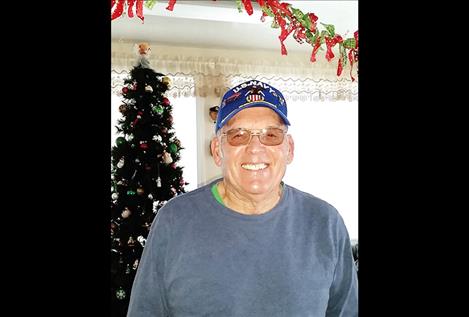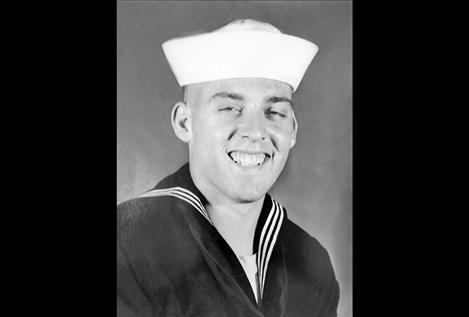Veteran Spotlight
Hugh Henderson November 20, 1942 Viet Nam Era Navy - E5 2nd Class Petty Officer, Electrician
Hey savvy news reader! Thanks for choosing local.
You are now reading
1 of 3 free articles.
Growing up on Chesapeake Bay, Maryland, the sea was always part of Hugh Henderson’s life. He belonged to the Sea Scouts, which is part of the Boy Scouts organization and includes a navy uniform. In October of 1960, Hugh became a “Kiddy Cruiser” in the Navy at the age of 18 and out at 21. His dad had to sign for him since he didn’t turn 18 until November.
Hugh went to Navy Boot Camp at Great Lakes, Illinois. Like everyone else, he was scared to death of doing the wrong thing. He became part of a special team that marched in front of the company so he didn’t have to do a lot of the regular boot camp stuff. His commanding officer couldn’t figure out how he could give Hugh orders and Hugh would sit around but somehow the job got done. Then, one day, Hugh was in line for shots with his twin brother and the mystery was solved. Hugh and his brother went into the Navy together with service numbers only three digits apart. After about six weeks of boot camp, they got leave to go home for Christmas.
After the holidays, Hugh reported back to Great Lakes for “A School” to become an electrician and his brother went to San Diego, California, which was the first time they were ever split up. Hugh remembers Great Lakes as being “colder than crap.” The men were told during instrument voltage testing not to hold one probe and touch the other to your head, but, of course, someone had to try it, “Ouch!”
Hugh graduated after about three months as a “Fireman” E3. That gave him a prized ball above three stripes on his sleeve. Hugh’s duty assignment was electrical repair on the Subtender (submarine tender) USS Orion (AS-18) out of Norfolk, Virginia. Submarines would tie up to the ship and bring aboard whatever parts needed repair. President Kennedy brought back a lot of decommissioned ships, and Hugh’s next assignment was on an “Amphib,” the USS Ruchamkin (APD-89). Hugh worked on many of these ships as an electrician all over the Caribbean and made E4 rank. In 1962, his ship moved a mile off the coast of Cuba. The crew was never told why, but later, he saw the story on TV and realized the action was part of the Cuban Missile Crisis.
Hugh learned about sour milk when in transit from Gitmo (Guantanamo Bay, Cuba.) The milk would sometimes sit on deck in the hot sun before being moved to the refrigerators, so, “always take a taste before you drink it.” When Hugh buys milk today, there are certain brands that he avoids because he says they have a “taste.”
One time when Hugh was in transit back to the LPH Okinawa, he was part of the “ship’s company,” so he only did instruction or other “experienced repair work.” That was good duty.
In 1963, Hugh put in for a transfer to the USS Sperry (AS-12) in San Diego where his brother was, and it was approved. After a 30-day leave, he began his new job. Being a twin once again led to interesting situations: Hugh got chewed out by a Division Officer for “being in the wrong shop.” Hugh’s job was to repair motors, etc. off submarines. Another time, a sub in dry dock sprung a leak in the air-conditioning system and Hugh found himself working in bilge in cramped quarters. Another time, in Acapulco, Mexico, he was working on throttles and it was 132 degrees in the engine room.
Hugh never wanted to serve on a sub. In his job, every day on a subtender was different, and he had chances to figure out challenges, like re-cutting brushes for a motor that had been put together wrong. Although he lived on ship, he could go ashore every three days.
After Hugh and his brother got out in November of 1963, one week before their birthday, they drove home together. His service time actually included active duty status for an additional three years, during which he could have been called back but that didn’t happen. Hugh did get an offer from the Navy Reserves in Fort McHenry, Baltimore, Maryland, that they needed an electrician, but he turned it down. He went to a vocational school run by the unions for electrical work in construction. In this apprentice program, he worked eight-hour days and went to school for two hours at night. After five years, he got his certificate – and it says “plumber.”
Hugh didn’t know anything about Viet Nam at that time. He never considered staying in. He didn’t like doing the many things that didn’t really need doing, such as cleaning what didn’t need cleaning. He says he wasn’t “military enough.” He thinks the draft is fair – rich and poor both serve. It’s okay for women to be in the military if they can do the job but “don’t expect me to do your job for you.”
Hugh says he got a good education and believes the military helped him through those “transition years” when a lot of young people get into trouble. He doesn’t look back and has no regrets. He’d do the same thing over again, he said.
Thank you for your service, Hugh.

















